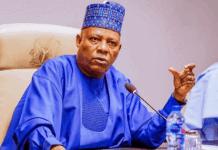Shareholders of Fidelity Bank Plc have commended the reclassification of the bank shares on the Nigerian Exchange Limited (NGX) from small stock to medium stock.
They said the development will spur the bank rating and motivate the Mrs. Nneka Onyeali-Ikpe-led management of the bank to achieve more impressive results for shareholders in years ahead.
The NGX on Friday reclassified Fidelity Bank Plc from small price stock to medium price stock.
However reacting to the upgrade in a telephone interview with Daily Champion, National Co-ordinator, Pragmatic Shareholders Association of Nigeria, Mrs. Bisi Bakare said that many stocks have been under priced for many years, adding that Fidelity Bank stock was one of them.
She said, “As a shareholder of the bank, I commend the reclassification of the bank shares on NGX index from small stock to medium stock. With all the facts stated, I believe it will spur the bank rating and encourage them to achieve more in years to come.
Also speaking, National Co-ordinator of Progressive Shareholders Association of Nigeria (PSAN) Mr. Boniface Okezie maintained that Fidelity Bank stocks deserve the lift.
He said that Fidelity Bank has been well managed and nurtured over the years, adding that its rapid growth is inevitable.
According to him, the bank’s growth has been phenomenal, while its branch network has also witnessed tremendous growth over the years.
He further stated that the balance sheets size of the bank is also into trillions of Naira.
Okezie noted that the adjustment clearly shows that Fidelity Bank has joined the big players in the banking industry, and seriously striving to become a Tier 1 bank.
He said, “don’t also forget that its stock price is above N7 as at the close of the market last week. It will remain so because the first quarter shows remarkable promise; going by such results, more dividends will also come in a big way since the bank’s dividends is looking up trends now.
“We have come to embrace the stock based on lots of good work taking place on technology, driving the bank’s operations across branches which is commendable.
“Customer service has also improved tremendously as staffs welfare and training is been felt among its workforce. These are the things that move Institutions into big club.
Daily Champion recall that following impressive run in the stock market in recent months, the NGX on Friday reclassified Fidelity Bank Plc from small price stock to medium price stock.
A statement by Joseph Kadiri, Media Relations, Corporate Communications of the NGX, said the reclassification became imperative because the Bank’ shares have been trading above the N5.00 mark since February 2023.
“Rule 15.29 of the Rulebook of The Exchange, 2015 (Dealing Members’ Rules) notes that equities priced above N5 per share for at least four of the most recent six months of trading, or new security listings priced above N5 per share at the time of listing on NGX are classified as medium price stock,” the statement said.
“According to NGX, Fidelity Bank Plc traded above the N5.00 mark on 20 February 2023 and has remained above the N5 mark up until close of business on 30 June 2023.
“This indicates that FIDELITYBK has been trading above N5 for at least four months in the last six months. Therefore, it should be reclassified from small price stock to medium price stock.”
In April, the bank released its audited financial statement and accounts to the investing public.
A key aspect of the report was a recommendation of a 42.9 per cent increase in dividend payout by the board of directors of the bank.
In one of the highest return growths in the stock market, Fidelity Bank, which set a personal record with its first interim dividend in 2022, increased cash dividends payable to shareholders for the 2022 financial year from N10.137 billion in 2021 to N15.7 billion in 2022.
According to regulatory filing at the NGX, shareholders, who received interim dividend of 10 kobo per share earlier in 2022, received a final dividend per share of 40 kobo, totaling a payout of 50 kobo for the 2022 business year as against 35 kobo paid for the 2021 business year.
According to the audited statement and accounts for the year ended December 31, 2022 profitability doubled and was driven by strong growths in the top-line and the structural balance of the bank’s operations.
For instance Gross earnings rose by 34.4 per cent in 2022 to N337.05 billion as against N250.78 billion in 2021.
Segmental topline analysis showed that the bank’s performance was driven largely by its core commercial banking operations.
Gross interest income rose by 45.2 per cent from N203.57 billion to N295.58 billion, representing 87.7 per cent and 81.2 per cent of gross earnings in 2022 and 2021 respectively.
After interest expenses, net interest income stood at N152.70 billion in 2022 compared with N94.88 billion in 2021, an increase of 60.94 per cent.
Total operating expenses stood at N120.78 billion in 2022 as against N96.31 billion in 2021, an increase of 25.4 per cent; lagging behind top-line growth.
Also, expenses were driven by more than a quarter growth in other non-personnel operating expenses, reflecting the impact of spiraling hyperinflation that characterised the 2022 business year.
After taxes, net profit rose from N23.10 billion to N46.72 billion, an increase of 102.2 per cent. With these, earnings per share rose correspondingly from 80 kobo in 2021 to N1.61 in 2022.
Total assets hit the N4 trillion mark at N3.99 trillion in 2022 as against N3.28 trillion in 2021, an increase of 21.65 per cent. Customer deposits, which underlines public acceptance and market status, grew by 27.7 per cent from N2.02 trillion to N2.58 trillion.
Meanwhile, Managing Director and Chief Executive Officer, Fidelity Bank Plc, Mrs Nneka Onyeali-Ikpe said the 2022 performance reflected the bank’s continuing focus on its execution strategy, despite global and national macroeconomic headwinds.
She pointed out that improvements in the profitability was driven by a business-wide understanding of the key goals and strategies as the bank continued to prioritise investments in human capital and technology as enablers for growth.





















